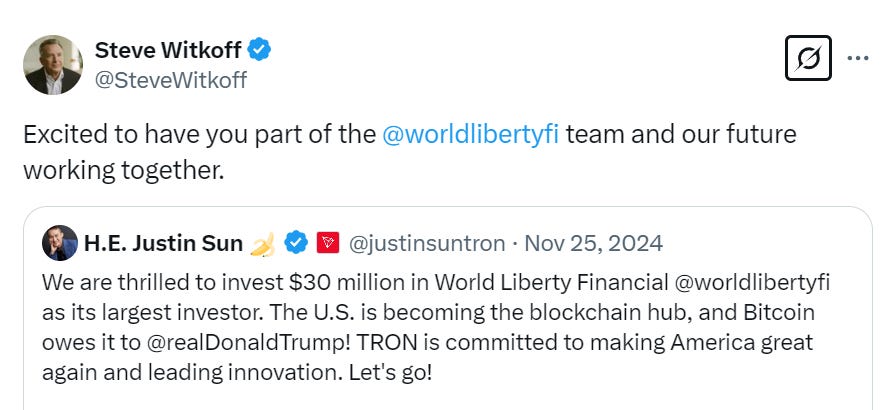The President Took A $75 Million Bribe And We All Saw It
Justin Sun's payoff to Trump is now considered a model for how to influence the president.
President Trump was bribed $75 million by a jurisdiction-hopping Chinese crypto entrepreneur known for his many brushes with illicit activity, after which the SEC dropped its fraud case into him. We know this because it happened in the open.
On November 25, 2024, Justin Sun, the Tron founder whose blockchain is a linchpin in the money-laundering networks for global cybercrime, bought $30 million worth of $WLFI tokens, the governance token from the Trump family’s World Liberty Financial crypto company. Sun announced himself as the largest investor in WLF.
Sun’s contribution was celebrated by WLF co-founder Alex and Zach Witkoff, whose father is Steve Witkoff, the real-estate mogul serving as Trump’s Middle East diplomatic envoy.
Dad also offered his support:
On January 19, 2025, Sun announced he had bought $45 million worth of $WLFI tokens.
The $WLFI tokens are useless except as a potential influence vehicle for President Trump and his inner circle. Right now you can't move the $WLFI token off the company’s platform. You can't sell or trade it. It’s not listed on exchanges. Buying it is essentially a donation to Donald Trump, which is why not many tokens sold before Sun jumped aboard. World Liberty Financial co-founder Zak Folkman has said that Sun’s participation helped jumpstart the project. “[Sun] saw that regardless of the outcome, this project is a monumental move forward for the entire crypto community,” said Folkman at a recent conference. The company eventually sold $590 million worth of tokens.
On February 27, 2025, the SEC paused its fraud case against Sun.
On March 13, the Wall Street Journal reported that the Trump family had held talks with Binance, in which Trump would pardon Binance CEO Changpeng Zhao and invest in Binance’s US division. Zhao spent 4 months in federal prison as part of a plea deal over his company’s violation of money laundering laws. Binance agreed to pay $4.3 billion — the largest fine in U.S. corporate history. Binance was sued by the SEC — a case that was recently “put on hold” by Trump’s SEC.
Binance's approach, according to the Journal, was modeled on Sun's obvious quid pro quo:
According to Bloomberg, it was Steve Witkoff who met with Zhao in Abu Dhabi in December to discuss a possible Binance deal.
It doesn't get more explicit or brazen than this. The president received a $75 million payment for a political favor, and we all saw it happen. It worked so well that the deal is now considered a proof-of-concept for others seeking influence and favors to get into Trump’s good graces, including the world’s most corrupt cryptocurrency exchange — a criminal organization that received severe penalties under the last administration.
Given the immunity granted by the Supreme Court to the president and the administration's announcement that it wouldn't enforce the Foreign Corrupt Practices Act, this deal might be considered essentially legal. There is simply no penalty or sanction — not even a hint of judicial procedure — when Trump breaks the law anymore. The inspectors general are gone, and the opposition party, with no majority in either house of Congress, has limited investigatory powers. Trump is free to indulge his kleptocratic appetites. Who will stop him?










If you need to explain that a behavior is “technically legal,” then we can be rest assured that it’s wrong — even if it’s not a crime, per se. That’s the devil talking, brother.
> "Steve Witkoff, the real-estate mogul serving as Trump’s Middle East diplomatic envoy"
Witkoff also negotiated the release of Russian money launder / BTC-e crypto bro Alexander Vinnik in the Marc Fogel prisoner exchange.
BTC-e was used by Putin to fund the early incursions into Ukraine back around 2016.